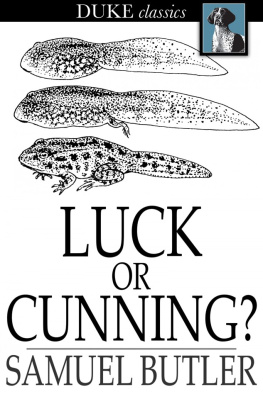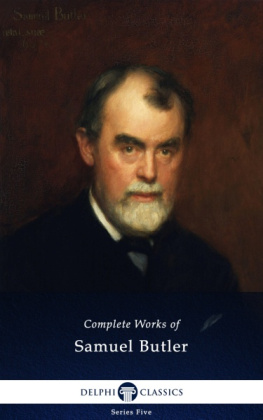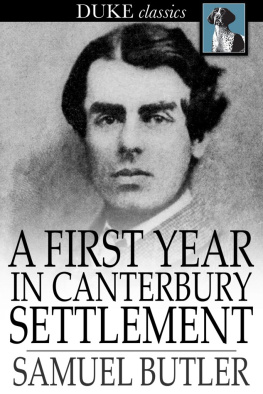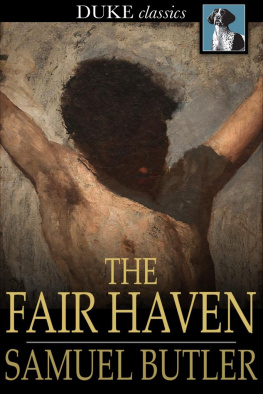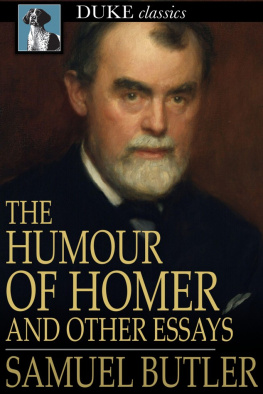Samuel Butler - Luck or Cunning?: As the Main Means of Organic Modification
Here you can read online Samuel Butler - Luck or Cunning?: As the Main Means of Organic Modification full text of the book (entire story) in english for free. Download pdf and epub, get meaning, cover and reviews about this ebook. year: 2015, publisher: Duke Classics, genre: Science. Description of the work, (preface) as well as reviews are available. Best literature library LitArk.com created for fans of good reading and offers a wide selection of genres:
Romance novel
Science fiction
Adventure
Detective
Science
History
Home and family
Prose
Art
Politics
Computer
Non-fiction
Religion
Business
Children
Humor
Choose a favorite category and find really read worthwhile books. Enjoy immersion in the world of imagination, feel the emotions of the characters or learn something new for yourself, make an fascinating discovery.
- Book:Luck or Cunning?: As the Main Means of Organic Modification
- Author:
- Publisher:Duke Classics
- Genre:
- Year:2015
- Rating:5 / 5
- Favourites:Add to favourites
- Your mark:
- 100
- 1
- 2
- 3
- 4
- 5
Luck or Cunning?: As the Main Means of Organic Modification: summary, description and annotation
We offer to read an annotation, description, summary or preface (depends on what the author of the book "Luck or Cunning?: As the Main Means of Organic Modification" wrote himself). If you haven't found the necessary information about the book — write in the comments, we will try to find it.
Though today best remembered as a satirist and novelist, British author Samuel Butler was also deeply involved in the scientific debates of his day. In this volume of essays, Butler mounts a compelling alternative theory to the Darwinian model that was starting to gain traction at the time.
Luck or Cunning?: As the Main Means of Organic Modification — read online for free the complete book (whole text) full work
Below is the text of the book, divided by pages. System saving the place of the last page read, allows you to conveniently read the book "Luck or Cunning?: As the Main Means of Organic Modification" online for free, without having to search again every time where you left off. Put a bookmark, and you can go to the page where you finished reading at any time.
Font size:
Interval:
Bookmark:

As the Main Means of Organic Modification
First published in 1887
ISBN 978-1-63421-462-9
Duke Classics
2015 Duke Classics and its licensors. All rights reserved.
While every effort has been used to ensure the accuracy and reliability of the information contained in this edition, Duke Classics does not assume liability or responsibility for any errors or omissions in this book. Duke Classics does not accept responsibility for loss suffered as a result of reliance upon the accuracy or currency of information contained in this book.
This second edition of Luck, or Cunning? is a reprint of the firstedition, dated 1887, but actually published in November, 1886. Theonly alterations of any consequence are in the Index, which has beenenlarged by the incorporation of several entries made by the authorin a copy of the book which came into my possession on the death ofhis literary executor, Mr. R. A. Streatfeild. I thank Mr. G. W.Webb, of the University Library, Cambridge, for the care and skillwith which he has made the necessary alterations; it was atroublesome job because owing to the re-setting, the pagination wasno longer the same.
Luck, or Cunning? is the fourth of Butler's evolution books; it wasfollowed in 1890 by three articles in The Universal Review entitled"The Deadlock in Darwinism" (republished in The Humour of Homer),after which he published no more upon that subject.
In this book, as he says in his Introduction, he insists upon twomain points: (1) the substantial identity between heredity andmemory, and (2) the reintroduction of design into organicdevelopment; and these two points he treats as though they havesomething of that physical life with which they are so closelyassociated. He was aware that what he had to say was likely toprove more interesting to future generations than to his immediatepublic, "but any book that desires to see out a literary three-scoreyears and ten must offer something to future generations as well asto its own." By next year one half of the three-score years and tenwill have passed, and the new generation by their constant enquiriesfor the work have already begun to show their appreciation ofButler's method of treating the subject, and their readiness tolisten to what was addressed to them as well as to their fathers.
HENRY FESTING JONES.
March, 1920.
This book, as I have said in my concluding chapter, has turned outvery different from the one I had it in my mind to write when Ibegan it. It arose out of a conversation with the late Mr. AlfredTylor soon after his paper on the growth of trees and protoplasmiccontinuity was read before the Linnean Societythat is to say, inDecember, 1884and I proposed to make the theory concerning thesubdivision of organic life into animal and vegetable, which I havebroached in my concluding chapter, the main feature of the book.One afternoon, on leaving Mr. Tylor's bedside, much touched at thedeep disappointment he evidently felt at being unable to completethe work he had begun so ably, it occurred to me that it might besome pleasure to him if I promised to dedicate my own book to him,and thus, however unworthy it might be, connect it with his name.It occurred to me, of course, also that the honour to my own bookwould be greater than any it could confer, but the time was not onefor balancing considerations nicely, and when I made my suggestionto Mr. Tylor on the last occasion that I ever saw him, the manner inwhich he received it settled the question. If he had lived I shouldno doubt have kept more closely to my plan, and should probablyhave been furnished by him with much that would have enriched thebook and made it more worthy of his acceptance; but this was not tobe.
In the course of writing I became more and more convinced that noprogress could be made towards a sounder view of the theory ofdescent until people came to understand what the late Mr. CharlesDarwin's theory of natural selection amounted to, and how it wasthat it ever came to be propounded. Until the mindless theory ofCharles Darwinian natural selection was finally discredited, and amindful theory of evolution was substituted in its place, neitherMr. Tylor's experiments nor my own theories could stand much chanceof being attended to. I therefore devoted myself mainly, as I haddone in "Evolution Old and New," and in "Unconscious Memory," toconsidering whether the view taken by the late Mr. Darwin, or theone put forward by his three most illustrious predecessors, shouldmost command our assent.
The deflection from my original purpose was increased by theappearance, about a year ago, of Mr. Grant Allen's "Charles Darwin,"which I imagine to have had a very large circulation. So important,indeed, did I think it not to leave Mr. Allen's statementsunchallenged, that in November last I recast my book completely,cutting out much that I had written, and practically starting anew.How far Mr. Tylor would have liked it, or even sanctioned its beingdedicated to him, if he were now living, I cannot, of course, say.I never heard him speak of the late Mr. Darwin in any but terms ofwarm respect, and am by no means sure that he would have been wellpleased at an attempt to connect him with a book so polemical as thepresent. On the other hand, a promise made and received as minewas, cannot be set aside lightly. The understanding was that mynext book was to be dedicated to Mr. Tylor; I have written the bestI could, and indeed never took so much pains with any other; to Mr.Tylor's memory, therefore, I have most respectfully, andregretfully, inscribed it.
Desiring that the responsibility for what has been done should restwith me, I have avoided saying anything about the book while it wasin progress to any of Mr Tylor's family or representatives. Theyknow nothing, therefore, of its contents, and if they did, wouldprobably feel with myself very uncertain how far it is right to useMr. Tylor's name in connection with it. I can only trust that, onthe whole, they may think I have done most rightly in adhering tothe letter of my promise.
October 15, 1886.
I shall perhaps best promote the acceptance of the two main pointson which I have been insisting for some years past, I mean, thesubstantial identity between heredity and memory, and thereintroduction of design into organic development, by treating themas if they had something of that physical life with which they areso closely connected. Ideas are like plants and animals in thisrespect also, as in so many others, that they are more fullyunderstood when their relations to other ideas of their time, andthe history of their development are known and borne in mind. Bydevelopment I do not merely mean their growth in the minds of thosewho first advanced them, but that larger development which consistsin their subsequent good or evil fortunesin their reception,favourable or otherwise, by those to whom they were presented. Thisis to an idea what its surroundings are to an organism, and throwsmuch the same light upon it that knowledge of the conditions underwhich an organism lives throws upon the organism itself. I shall,therefore, begin this new work with a few remarks about itspredecessors.
I am aware that what I may say on this head is likely to prove moreinteresting to future students of the literature of descent than tomy immediate public, but any book that desires to see out a literarythree-score years and ten must offer something to future generationsas well as to its own. It is a condition of its survival that itshall do this, and herein lies one of the author's chiefdifficulties. If books only lived as long as men and women, weshould know better how to grow them; as matters stand, however, theauthor lives for one or two generations, whom he comes in the end tounderstand fairly well, while the book, if reasonable pains havebeen taken with it, should live more or less usefully for a dozen.About the greater number of these generations the author is in thedark; but come what may, some of them are sure to have arrived atconclusions diametrically opposed to our own upon every subjectconnected with art, science, philosophy, and religion; it is plain,therefore, that if posterity is to be pleased, it can only be at thecost of repelling some present readers. Unwilling as I am to dothis, I still hold it the lesser of two evils; I will be as brief,however, as the interests of the opinions I am supporting willallow.
Font size:
Interval:
Bookmark:
Similar books «Luck or Cunning?: As the Main Means of Organic Modification»
Look at similar books to Luck or Cunning?: As the Main Means of Organic Modification. We have selected literature similar in name and meaning in the hope of providing readers with more options to find new, interesting, not yet read works.
Discussion, reviews of the book Luck or Cunning?: As the Main Means of Organic Modification and just readers' own opinions. Leave your comments, write what you think about the work, its meaning or the main characters. Specify what exactly you liked and what you didn't like, and why you think so.

